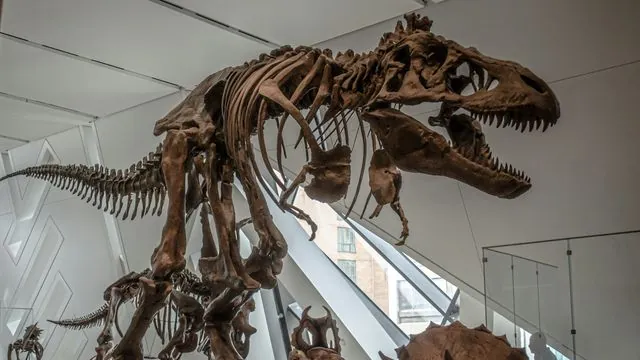
Dinosaurs Were Thriving Before the Asteroid? New Study Challenges Extinction Narrative
2025-04-09
Author: Rajesh
New Insights into Dinosaur Decline
A groundbreaking study published in *Current Biology* is shaking up everything we thought we knew about the dinosaurs' decline leading up to the catastrophic asteroid impact that marked the end of the Cretaceous period. Over the last 18 million years before this event, researchers meticulously analyzed the fossil record of North America, which includes more than 8,000 specimens.
The Myth of Decline Before Extinction
Conventional wisdom suggests that dinosaur species began to dwindle around 75 million years ago, but this new research indicates that this perceived decline may be misleading. According to lead author Dr. Chris Dean from UCL Earth Sciences, the fossil record the team examined shows that fewer fossils from this period were likely found due to limited access to exposed rocky locations.
Dr. Dean remarked, 'For over thirty years, scientists have debated whether dinosaurs were in decline before the asteroid struck. Our findings suggest that the evidence may have been misinterpreted due to sampling biases and geological changes influencing fossil discovery.'
Spotlight on Dinosaur Diversity
The research team employed advanced occupancy modeling techniques, previously used in ecology, to estimate the habitat occupancy of four dinosaur groups: Ankylosauridae, Ceratopsidae, Hadrosauridae, and Tyrannosauridae. Their findings indicated that these dinosaurs likely thrived in stable environments, contrary to the idea that they were on a downward trend.
Fossil Accessibility: The Key to Understanding?
The researchers found that while the likelihood of finding dinosaur fossils decreased over the final six million years before the asteroid impact, the actual habitats these creatures occupied remained stable. Factors such as geology and accessibility of rock layers significantly influenced fossil detection rates.
Interestingly, the study revealed that Ceratopsian dinosaurs, like the famed Triceratops, were more frequently discovered in later stages. This could be attributed to their preference for open plains, coinciding with significant ecological shifts as an inland sea retreated and altered available habitats.
Could Dinosaurs Have Survived?
Co-author Dr. Alessandro Chiarenza echoed the sentiment that the decline of dinosaurs may have been exaggerated: 'If we take the fossil record at face value, it seems that dinosaurs were in a downward spiral. However, our study suggests that this was more likely an artifact of geological dynamics rather than an actual decline in diversity.'
This revelation raises the tantalizing question: What if the asteroid had never struck? With the right conditions, dinosaurs could have possibly coexisted alongside mammals, birds, and other species, continuing their reign long after the Mesozoic era.
A New Narrative for the Age of Dinosaurs?
This study not only challenges long-accepted narratives about dinosaur extinction but also opens the door for further research into their diversity and ecological success. As scientists continue to unravel the complexities of the past, one thing seems clear: the story of dinosaurs is far from over.



 Brasil (PT)
Brasil (PT)
 Canada (EN)
Canada (EN)
 Chile (ES)
Chile (ES)
 Česko (CS)
Česko (CS)
 대한민국 (KO)
대한민국 (KO)
 España (ES)
España (ES)
 France (FR)
France (FR)
 Hong Kong (EN)
Hong Kong (EN)
 Italia (IT)
Italia (IT)
 日本 (JA)
日本 (JA)
 Magyarország (HU)
Magyarország (HU)
 Norge (NO)
Norge (NO)
 Polska (PL)
Polska (PL)
 Schweiz (DE)
Schweiz (DE)
 Singapore (EN)
Singapore (EN)
 Sverige (SV)
Sverige (SV)
 Suomi (FI)
Suomi (FI)
 Türkiye (TR)
Türkiye (TR)
 الإمارات العربية المتحدة (AR)
الإمارات العربية المتحدة (AR)